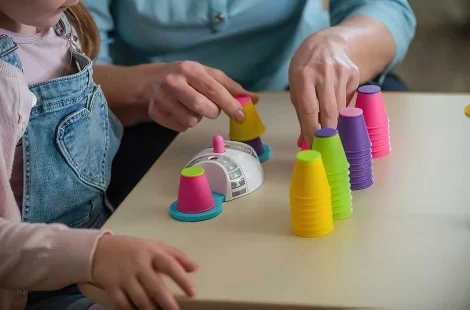Special education schools play a vital role in shaping the academic, social, and emotional growth of children with diverse learning needs. These schools are uniquely designed to provide personalized attention, adaptive teaching methods, and tailored support that address the individual strengths and challenges of each child. Unlike mainstream educational settings, special education schools focus on creating an inclusive environment where children with learning differences, developmental delays, or disabilities can thrive without feeling left behind.
Trained special educators play a central role in this process, using specialized strategies, individualized learning plans, and therapeutic interventions to foster learning, confidence, and independence. By focusing on the specific educational, social, and emotional requirements of students, these schools help children develop not only academic skills but also essential life skills such as communication, problem-solving, and social interaction. The importance of special education extends beyond academics—it nurtures the holistic development of children, recognizing their unique potential and celebrating their achievements.
What is Special Education?
Special education refers to an educational approach specifically designed to cater to children with diverse learning needs. The goal is not only to impart knowledge but also to develop essential life skills and emotional resilience. Children who benefit from special education may have:
- Learning disabilities such as dyslexia or dyscalculia.
- Autism spectrum disorders.
- Attention Deficit Hyperactivity Disorder (ADHD).
- Speech, hearing, or vision impairments.
- Emotional or behavioral challenges.
Key Features of Special Education:
- Individualized Education Programs (IEPs) designed to meet each child’s needs.
- Focused teaching methods using visual aids, technology, and hands-on activities.
- Collaboration between special educators, therapists, and parents.
- Regular monitoring and evaluation of academic, social, and emotional growth.
By addressing special educational needs, these schools ensure that children can overcome learning barriers and develop holistically.

The Role of Special Education Schools
Special education schools are more than classrooms—they are comprehensive learning environments that focus on nurturing every child’s potential. They play a vital role in shaping not only academic abilities but also social and emotional well-being.
How Special Education Schools Support Children:
- Personalized Learning Plans:
Every child is unique. Special education schools create tailored learning strategies based on detailed assessments of strengths and challenges. This individualized approach ensures children progress at their own pace. - Therapeutic Support:
Many schools integrate therapies such as occupational therapy, speech therapy, physiotherapy, and behavioral therapy to support holistic development. - Adaptive Teaching Methods:
Techniques such as interactive lessons, storytelling, visual aids, and assistive technology help children engage meaningfully with learning materials. - Inclusive Environment:
These schools promote acceptance, understanding, and peer interaction, which improves self-esteem, emotional resilience, and social skills. - Parent and Specialist Collaboration:
Active communication between educators, therapists, and parents ensures consistency and reinforcement of learning at home and in school. - Life Skills and Vocational Training:
In addition to academics, special education schools often teach essential life skills, from personal hygiene to basic vocational skills, preparing children for independence.
Through these practices, special education schools nurture individual learning abilities and create pathways for children to achieve academic and personal milestones.
Understanding the Role of Special Educators
A special educator is a trained professional who specializes in teaching children with special educational needs. Their role extends far beyond teaching—they design and implement individualized strategies, provide emotional support, and monitor progress.
Responsibilities of Special Educators:
- Designing and implementing Individualized Education Plans (IEPs).
- Using innovative and adaptive teaching methods.
- Collaborating with therapists and parents to ensure consistent learning support.
- Monitoring academic, social, and emotional development.
- Advocating for children’s rights and needs within the educational system.
Understanding the special educator meaning helps parents and caregivers appreciate the critical role these professionals play in shaping the future of children with special needs.
Supporting the Education of Children with Special Needs
The education of children with special needs requires more than conventional teaching. It demands patience, understanding, and evidence-based strategies. Special education schools provide a safe and structured environment where children can thrive.
Key Benefits of Specialized Education:
- Enhanced Academic Performance: Individualized learning helps children grasp concepts more effectively.
- Improved Communication Skills: Speech therapy and communication tools help children express themselves confidently.
- Social Integration: Interaction with peers builds social skills, empathy, and teamwork.
- Emotional Well-being: Positive reinforcement boosts self-esteem and reduces anxiety.
- Life Preparedness: Vocational training and life skills lessons prepare children for independence.
Special education focuses on strength-based learning, ensuring children develop confidence in their abilities rather than feeling limited by their challenges.

Importance of Special Education
The importance of special education lies in creating equitable learning opportunities and fostering inclusivity. Every child has the right to an education that meets their needs and supports their development.
Why Special Education Matters:
- Promotes equal opportunities for learning and personal growth.
- Encourages children to develop their unique abilities to their fullest potential.
- Prepares children for independent living, higher education, and careers.
- Fosters societal empathy, understanding, and acceptance of diversity.
- Bridges the gap between learning challenges and academic success.
Special education is not just beneficial—it is essential for building inclusive communities where every individual’s potential is recognized and nurtured.
Real-World Examples of Special Education Success
- Individualized Learning Success: A child with dyslexia improves reading and writing skills through specialized reading programs.
- Autism Support: Social stories, visual schedules, and structured play help children on the autism spectrum develop communication and social skills.
- Inclusive Integration: Children with ADHD thrive in environments where lessons are interactive, engaging, and adapted to their attention spans.
These examples demonstrate that with the right support, children with special needs can achieve milestones that were once considered unattainable.
Conclusion
Special education schools are indispensable in nurturing the individual learning abilities of children with special educational needs. Through personalized teaching, therapeutic support, and inclusive practices, these schools empower children to reach their full potential. Special educators play a central role in guiding children, designing tailored learning strategies, and providing the support necessary for academic, social, and emotional growth. By recognizing and fostering each child’s unique strengths, special education schools lay a strong foundation for lifelong learning, independence, and confidence. Education is not just about imparting knowledge—it’s about unlocking the potential within every child, and special education ensures that no child is left behind.







